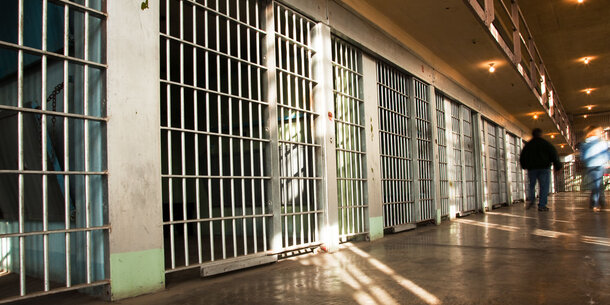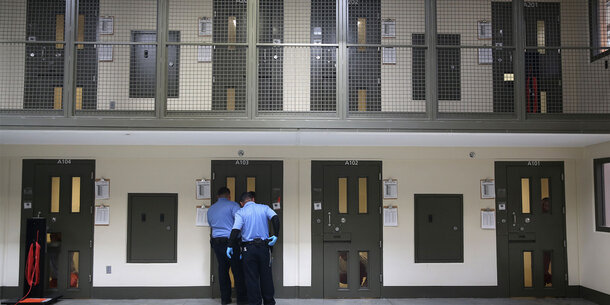California has suffered a setback in its legal battle against the federal government and Geo Group, one of the nation’s largest private prison firms. The Ninth Circuit Court of Appeals has ruled that California cannot override the federal government’s decision to use private contractors to run immigration detention facilities. While the state can appeal the decision to the Supreme Court, it is unlikely that the Court’s conservative supermajority would rule in California’s favor.
The federal government contracts out most of its immigration detention beds to for-profit firms. While it argues this allows for “better flexibility in meeting fluctuating demand,” these contracts also create perverse incentives that make it difficult to reduce immigration detention populations and often waste taxpayer dollars.
For example, a 2021 Government Accountability Office report revealed that U.S. Immigration and Customs Enforcement has increased its number of agreements guaranteeing minimum payments, whereby facility operators are paid for a fixed number of beds regardless of use. This leads the agency to consistently overbuy beds, often paying for empty ones. In fact, ICE spent $20.5 million in May 2020 for over 12,000 unused beds a day, on average.
In California, advocates have pushed for the state to reduce its reliance on private operators to manage its prisons and to eliminate for-profit firms from managing immigrant detention centers in the state, citing concerns about the health and welfare of people behind bars in these facilities. In 2019, the state enacted A.B. 32, a law written by now-Attorney General Rob Bonta, who was a state assemblyman at the time.
The legislation has received a lot of attention as one of the only state laws in the nation that would ban for-profit firms from operating both state prisons and federal immigration detention centers within the state. A similar law in New York is narrower and only prohibits private providers from running state prisons and local jails. Illinois goes a step further by prohibiting private prisons from holding state prisoners in addition to prohibiting state and local agencies from contracting for the detention of individuals in a facility owned, managed, or operated by a private firm.
In the case of California, A.B. 32 prohibits California’s Department of Corrections and Rehabilitation from signing or renewing a contract with a private prison company after January 1, 2020. Further, the sweeping legislation prevents the state from holding people in for-profit prisons and immigration detention facilities starting in 2028. All eyes are on the litigation challenging the new legislation, given that at the time the law was enacted, California had 10 privately run facilities with nearly 11,000 beds. Seven of the facilities were managed by Geo Group, a Florida-based private firm that manages prisons and detention centers.
In 2019, both Geo Group and the Trump administration filed federal lawsuits challenging the law. In 2020, a district judge largely upheld the law, finding that it doesn’t interfere with the operations of the federal government since A.B. 32 regulates private prison operators. The ruling also acknowledged that “California possesses the general authority to ensure the health and welfare of inmates and detainees in facilities within its borders.” Geo Group and the federal government appealed the ruling, and in a 2–1 decision, a three-judge Ninth Circuit panel reversed the lower court.
On September 26, the full Ninth Circuit held that A.B. 32 violates the Constitution’s Supremacy Clause because “to comply with California law, ICE would have to cease its ongoing immigration detention operations in California and adopt an entirely new approach in the state.”
The ruling is an obvious blow to the state’s efforts against for-profit immigrant detention, but its broader impact extends beyond California. The federal government and private contractors will surely look to the Ninth Circuit case as precedent to challenge other states, such as Illinois, that attempt to block private immigration detention centers in their jurisdictions.
The political ramifications of the case are also significant, as the Biden administration has continued to pursue the litigation. This is despite President Biden’s campaign promise to end the federal government’s use of private prisons “for any detention, including detention of undocumented immigrants.” In the same vein, the president’s 2021 executive order to eliminate the use of privately operated criminal detention facilities does not impact immigration detention centers that private firms manage on ICE’s behalf.
Nevertheless, the Biden administration has since taken significant steps to reduce America’s reliance on for-profit firms to manage ICE detention beds. As of September 2022, there were a little more than 25,000 detainees in ICE detention centers, compared to more than 51,000 ICE detainees in September 2019. The administration has eliminated contracts with an additional number of facilities that are holding immigrant detainees, and it reduced funding in its Fiscal Year 2023 budget to 25,000 ICE detention beds from the current 34,000 beds.
The administration also requested an $87 million increase in funding for its Alternatives to Detention programs, in which undocumented individuals and families are monitored by technology in their community in lieu of remaining behind bars in detention centers. The federal government has made a deliberate choice to move toward using the Alternatives to Detention programs over detaining undocumented people behind bars, with participation skyrocketing over the past three years. In fact, today, the program monitors 316,700 families and single individuals, up from 83,186 in September 2019.
Despite marked progress at reducing the number of undocumented immigrants behind bars, President Biden should continue to make strides to close ICE detention centers — both private and public — as it is the humane thing to do.






